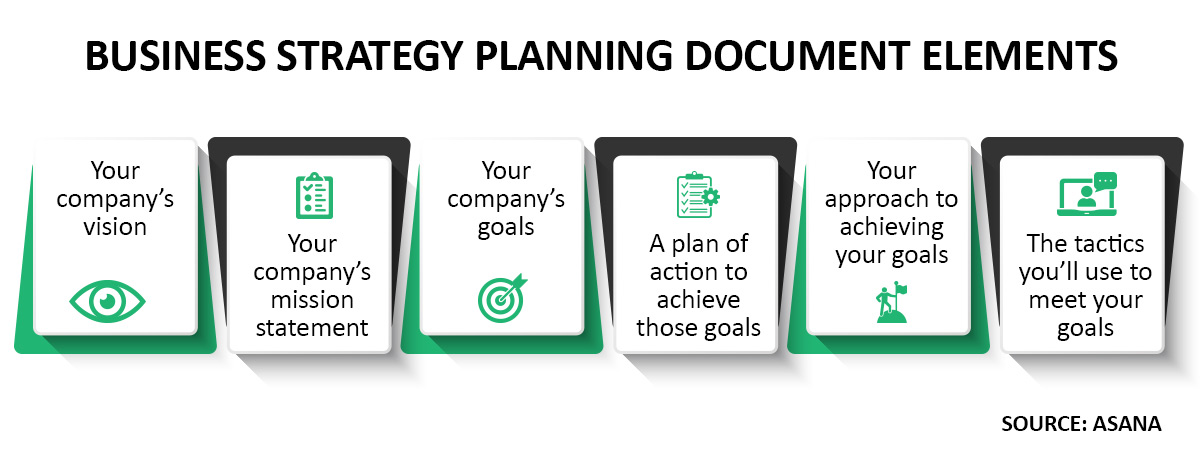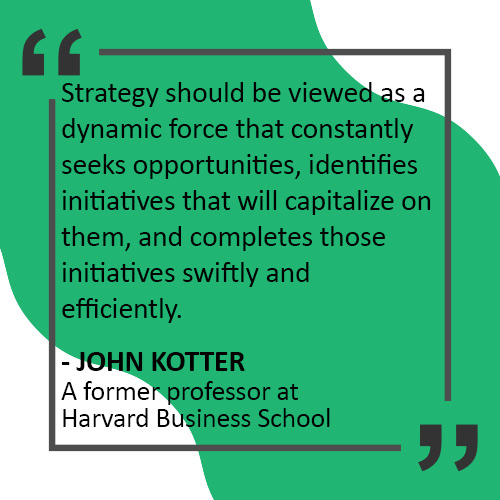
According to Innosight’s “Strategic Readiness and Disruptive Change” survey, only 12% of organizations had sustainable business strategy planning for over 5 years. The other 88% lack a formal strategy, risking stagnation or short-term gains. Every few years, larger organizations often engage in periodic future planning. Often, these business strategy planning documents are shelved until the next planning cycle. Conversely, many smaller and newer organizations, driven by urgency, may not allocate the necessary time and effort to the strategic planning process. Additionally, it's worth noting that only 63% of businesses plan beyond a one-year horizon. However, they fail to realize that simply proceeding in any direction does not guarantee success.
For organizations of all sizes, a more robust annual business strategy planning process plays a crucial role in shaping future success, ensuring profitability, enhancing value, and increasing overall impact. A well-crafted strategic plan provides a clear direction for your organization, enabling you to ensure that your teams are engaged in projects that have the most significant impact. The strategic planning process does more than just help you pinpoint your organization's future course; it also results in a tangible document that can be shared with employees and stakeholders, keeping them well-informed. This article discusses what business strategy planning looks like, the benefits, and the use of predictive intelligence in the development of strategic plans.
What is Business Strategy Planning?
Business strategy planning is a continuous, collaborative process through which an organization charts its course by bringing all its stakeholders together. This process involves an examination of current realities and the formulation of a vision for the future.
It entails a comprehensive evaluation of an organization's strengths, weaknesses, available resources, and the opportunities that lie ahead. Business strategic planning aims to proactively anticipate upcoming industry trends. Within this process, the organization not only develops a vision but also articulates its mission and establishes long-term, forward-looking strategic objectives.

These strategic objectives serve as the foundation for setting operational goals and incremental milestones. The operational plan is characterized by well-defined objectives and associated initiatives, each tied to measurable metrics that hold everyone accountable. Importantly, this plan must be flexible enough to accommodate adjustments as needed, allowing for the reallocation of resources in response to both internal and external factors. It is here that projects play a critical role in business strategy planning by providing a structured approach to achieving strategic goals and objectives. Projects translate that direction into actionable steps. By carefully linking projects to your strategic goals, you can achieve a competitive advantage and navigate the path to success.
Do You Need a Business Strategy Planning?
It's essential for every business to have a robust strategic planning process in place. Yet, the proportion of businesses attempting to function without a well-defined plan or one that is effectively communicated may be quite astonishing. Research conducted by OnStrategy reveals that 86% of executive teams dedicate less than one hour per month to strategic discussions, and a staggering 95% of the average workforce lacks a clear understanding of their organization's strategy.
Whether you’re considering strategic planning for a company, project, or an individual, the execution of strategic plans can derail due to several factors, such as:
- Setting unrealistic goals and juggling too many priorities,
- Inadequate communication,
- Employing inappropriate metrics for measurement, or
- Lack of leadership skills.
The degree to which the strategic plan document remains unused until the next planning cycle or evolves into a dynamic roadmap for the future is dependent on the individuals responsible for overseeing its implementation. Given the shortcomings in these aspects observed in numerous businesses, employing business strategy planning can provide you with a competitive edge. How is strategic planning different from business planning, you ask?
Differences Between a Strategic Plan and a Business Plan
A business plan serves as a valuable tool for outlining your strategy, especially when you're just launching your business. It ensures that all team members are aligned with your core business priorities and objectives. Additionally, a business plan can be instrumental in sharing your strategy with crucial investors and stakeholders during the initial stages of your business.
You should consider creating a business plan when:
- You are just starting your business, or
- Your business is undergoing significant restructuring.
If your business is already established, it's advisable to opt for a strategic plan rather than a business plan. Even if your company is relatively young, a strategic plan can build upon the foundational business elements you established early on, guiding your direction for the next three to five years.
When Is the Right Time to Develop a Strategic Plan?
 The ideal timeframe for creating a business strategy planning process typically falls within a three- to five-year interval, which can vary based on the pace of growth within your organization. However, for rapidly evolving organizations, a more frequent strategic planning cycle, such as every two to three years, might be warranted. Smaller businesses often find it necessary to create strategic plans more frequently, considering their evolving needs.
The ideal timeframe for creating a business strategy planning process typically falls within a three- to five-year interval, which can vary based on the pace of growth within your organization. However, for rapidly evolving organizations, a more frequent strategic planning cycle, such as every two to three years, might be warranted. Smaller businesses often find it necessary to create strategic plans more frequently, considering their evolving needs.
Since the primary purpose of a business strategy planning process is to outline your long-term objectives and the path to achieving them, it is advisable to embark on the process when you have achieved most, if not all, of your existing goals. Additionally, it's essential to initiate the strategic planning process when your organization is about to undergo a significant shift in its mission or is planning to venture into new markets. So, how do you improve your business strategy planning process and stay ahead of the competition?
The answer lies in effective project planning and execution. Projects often involve innovation and adaptation to changing market dynamics. They provide your businesses with opportunities to explore new ideas, technologies, and markets, allowing you to stay competitive and responsive to evolving customer needs. Additionally, by implementing projects in line with your business strategy planning, you can foster a culture of continuous improvement. Lessons learned from each project can be used to refine processes, optimize performance, and drive further innovation, ultimately enhancing the overall effectiveness of the business strategy. Furthermore, integrating modern technology solutions, especially AI-enabled predictive intelligence technology, into your projects provides foresight and enables data-driven decisions while creating a strong foundation for successful business strategy planning.
How Does a Predictive Intelligence Solution Help Your Business Strategy Planning?
Irrespective of the industry or the business’ size, the application of predictive analytics into projects has the potential to enhance overall business performance. For example, you can examine sales data from the past two to three years to forecast the expected performance of the upcoming fiscal year. Predictive analytics essentially involves data utilization and statistical analysis to evaluate the probability of future occurrences. This field of analytics leverages historical data to anticipate potential outcomes. Here are some real-world instances that underscore the importance of predictive intelligence in the business strategy planning process:
![]() Retail: Companies like Amazon employ predictive analytics to predict consumer demand, optimize inventory levels, and even anticipate the long-term value of customers.
Retail: Companies like Amazon employ predictive analytics to predict consumer demand, optimize inventory levels, and even anticipate the long-term value of customers.
![]() Healthcare: AI algorithms play a crucial role in predicting patient outcomes, enabling healthcare providers to deliver more individualized treatment plans.
Healthcare: AI algorithms play a crucial role in predicting patient outcomes, enabling healthcare providers to deliver more individualized treatment plans.
![]() Finance: In the stock market, AI-driven predictive analytics are instrumental in forecasting market trends and assisting investors in making well-informed decisions.
Finance: In the stock market, AI-driven predictive analytics are instrumental in forecasting market trends and assisting investors in making well-informed decisions.
The integration of predictive analytics empowers you, the business leaders, not only to survive but to thrive as you make data-driven decisions that are not only timely but also highly accurate.
Benefits of an Effective Strategic Planning Process
While the development of a strategy demands considerable effort, the benefits it yields are enduring. As the familiar adage goes, "Failing to plan is planning to fail." Dedication to reviewing and planning activities offers the following advantages:
- Setting up organizations, projects, and individuals for success,
- Elevated prospects of adhering to the planned course,
- Reduced likelihood of projects deviating from the path,
- Effective communication of progress throughout the organization,
- Use of metrics to facilitate adjustments as needed,
- Formulating enterprise-wide budgets aligned with the strategy,
- Achieving alignment across various parts of the organization,
- Establishing strong employee performance and compensation plans,
- Fostering a commitment to learning and training,
- Encouraging and rewarding innovation, and
- Heightening productivity.
 A robust business strategy planning process engages and motivates everyone, making them invested in the organization's success. Employees become instrumental in providing insights to management about what is or isn't functioning effectively at the operational level. This collaborative approach cultivates an environment where innovation thrives and productivity soars.
A robust business strategy planning process engages and motivates everyone, making them invested in the organization's success. Employees become instrumental in providing insights to management about what is or isn't functioning effectively at the operational level. This collaborative approach cultivates an environment where innovation thrives and productivity soars.
How to Build a Business Strategy Plan for Your Organization
Define the Mission and Vision
Initiate the strategic planning process by outlining the organization's future vision. Consider what project and business success should look like in the next five years. Craft a mission statement that articulates the organization's values and outlines the path to achieving the envisioned future. This mission statement should be rooted in the organization's core values.
Conduct a Comprehensive Assessment
This phase involves assessing the organization's strategic positioning. Collect project data from both internal and external sources, including stakeholders. Involve employees and customers in this research. A vital component of this stage is performing a SWOT analysis, which involves gathering insights from all stakeholders to identify the strengths, weaknesses, opportunities, and threats of each project or initiative to understand its impact on the business.
Forecast
Take the factors identified in the assessment into account and forecast the organization's financial value. While this forecast may evolve due to external forces, it provides an initial estimate of expected measurable outcomes, such as return on investment (ROI) or profits.
Set the Organizational Direction
Based on research and assessment, establish clear project goals and priorities for organizational success. Ensure that these goals are specific and achievable, avoiding overly ambitious or broad objectives.
Create Strategic Objectives
Develop strategic project objectives and initiatives. Consider four perspectives, as proposed by Robert S. Kaplan and David P. Norton (in their book The Strategy-Focused Organization), in the balanced scorecard methodology: financial, customer satisfaction, internal processes, and learning and growth. These objectives should be interrelated and evaluated simultaneously.
Align with Key Stakeholders
Involve all stakeholders in the strategic planning process through projects. Engaging stakeholders throughout the project lifecycle fosters collaboration, communication, and alignment of interests, which are essential for overall business strategy planning success. When everyone shares the same direction, decision-making becomes more cohesive and aligned.
Begin Strategy Mapping
Utilize strategy mapping to illustrate the cause-and-effect relationships between perspectives and link them to 12 to 18 strategic objectives. Strategy maps provide a visual representation that enhances understanding and knowledge sharing across the organization.
Determine Strategic Initiatives
Following the identification of strategic objectives, decide on the specific projects or initiatives that will help achieve these objectives. These initiatives can encompass areas like scope, budget, brand awareness, product development, and employee training.
Benchmark Performance Measures and Analysis
Assign metrics to inform SMART (specific, measurable, attainable, relevant, and time-based) goals based on the strategic initiatives of your business or projects. Create benchmarks and key performance indicators (KPIs) to assess progress and align workers' performance with long-term objectives.
Performance Evaluation
Conduct an evaluation to gauge the success of the project and business strategy planning process. Measure activities and progress toward objectives, enabling the refinement of plans and objectives to enhance overall performance. Think of your project or business strategy planning as a cyclical process that begins and ends with evaluation, allowing for necessary adjustments. The frequency of plan review may vary, with some organizations revisiting it annually and others more frequently, depending on industry dynamics.
Prioritize Your Business Strategy Planning Process
Business strategy planning is the roadmap to success—the blueprint that not only guides but also unites teams and stakeholders toward a common goal. Most businesses fall short of harnessing the full potential of strategic planning. Yet, the benefits are immense, from increased efficiency and productivity to overcoming the challenges of an ever-evolving business landscape and adapting to changing circumstances. That means you must have the right solution to plan, monitor, and report on all the various tasks, resources, and projects.
So, how can you revolutionize your strategies and make accurate decisions? By harnessing the power of modern technology, such as predictive intelligence. If you are looking for a solution that helps you turn your strategic initiatives or technology projects into a plan and assists you in proactively connecting organizational objectives to daily work, look no further. TrueProject, a predictive intelligence solution for project health and performance, helps you continually assess how each project contributes to your organization’s goals. The solution also provides deep insight into project plans and keeps them fully aligned. Overall, TrueProject is your complete C-Suite solution to getting maximum ROI on your project investments.
In the end, strategic planning isn't just about the plan itself; it's about the journey and the transformation it brings to your organization. So, whether you're a seasoned enterprise or a fledgling startup, the time to embark on your business strategy planning journey is now—because, as the saying goes, those who fail to plan, plan to fail.
More information on TrueProject at www.trueprojectinsight.com.
 About the Author:
About the Author:
Nivedita Gopalakrishna is a content marketing specialist within the TrueProject Marketing team with extensive experience in blog writing and website content creation across diverse industries. Nivedita’s proficiency in crafting engaging blog posts and informative website content is a testament to her years of experience. Beyond her prowess in written communication, Nivedita has a knack for creating visually appealing static graphics that have played a pivotal role in expanding TrueProject's marketing efforts. She has helped convey the brand's essence through thoughtful design choices and captivate audiences effectively. Outside the professional sphere, Nivedita is a trained classical singer and a fitness enthusiast, embodying creativity and wellness in and out of the office.
Endnotes:
- Landau, Peter. “Strategic Planning in Business.” ProjectManager, August 15, 2022. https://www.projectmanager.com/blog/strategic-planning-in-business
- Betz, Meredith. “Strategic planning: Read this before it's that time again.” BetterUp, November 29, 2022. https://www.betterup.com/blog/strategic-planning
- Carucci, Ron. “Executives Fail to Execute Strategy Because They’re Too Internally Focused.” Harvard Business Review, November 13, 2017. https://hbr.org/2017/11/executives-fail-to-execute-strategy-because-theyre-too-internally-focused
- Martins, Julia. “What is strategic planning? 5 steps and processes.” Asana, October 6, 2022. https://asana.com/resources/strategic-planning
- “5 steps of the strategic planning process.” Lucidchart, (n.d.). https://www.lucidchart.com/blog/5-steps-of-the-strategic-planning-process
- “The Strategy Confidence Gap.” Innosight, 2014. https://www.innosight.com/insight/the-strategy-confidence-gap/





